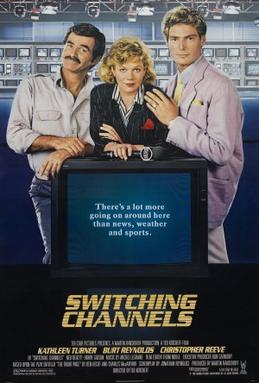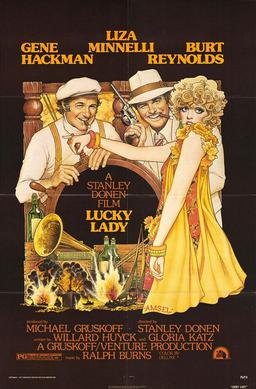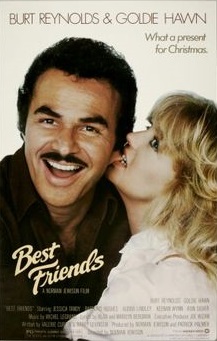
Lee Marvin was an American film and television actor. Known for his bass voice and prematurely white hair, he is best remembered for playing hardboiled "tough guy" characters. Although initially typecast as the "heavy", he later gained prominence for portraying anti-heroes, such as Detective Lieutenant Frank Ballinger on the television series M Squad (1957–1960). Marvin's notable roles in film included Charlie Strom in The Killers (1964), Rico Fardan in The Professionals (1966), Major John Reisman in The Dirty Dozen (1967), Ben Rumson in Paint Your Wagon (1969), Walker in Point Blank (1967), and the Sergeant in The Big Red One (1980).

Jaws is a 1975 American thriller film directed by Steven Spielberg, based on the 1974 novel by Peter Benchley. It stars Roy Scheider as police chief Martin Brody, who, with the help of a marine biologist and a professional shark hunter, hunts a man-eating great white shark that attacks beachgoers at a summer resort town. Murray Hamilton plays the mayor, and Lorraine Gary portrays Brody's wife. The screenplay is credited to Benchley, who wrote the first drafts, and actor-writer Carl Gottlieb, who rewrote the script during principal photography.

Burton Leon Reynolds Jr. was an American actor, most famous during the 1970s and 1980s. Reynolds first became known well as a result of featuring in television series, such as Gunsmoke (1962–1965), Hawk (1966), and Dan August (1970–1971). He had leading roles in movies, such as Navajo Joe (1966) and 100 Rifles (1969), and his breakthrough role was as Lewis Medlock in Deliverance (1972).

Jaws: The Revenge is a 1987 American horror film produced and directed by Joseph Sargent. The fourth and final film in the Jaws franchise, it stars Lorraine Gary, who came out of retirement to reprise her role from the first two films, along with new cast members Lance Guest, Mario Van Peebles, Karen Young and Michael Caine. Acting as a sequel to Jaws 2, the film focuses on a now-widowed Ellen Brody (Gary) and her conviction that a great white shark is seeking revenge on her family, particularly when it kills her youngest son, and follows her to the Bahamas.

Samuel Michael "Sam" Fuller was an American film director, screenwriter, novelist, journalist, actor, and World War II veteran known for directing low-budget genre movies with controversial themes, often made outside the conventional studio system. Fuller wrote his first screenplay for Hats Off in 1936, and made his directorial debut with the Western I Shot Jesse James (1949). He would continue to direct several other Westerns and war thrillers throughout the 1950s.

Switching Channels is a 1988 American comedy film remake of the 1928 play The Front Page, the 1931 film of the same name, and the 1940 film His Girl Friday. It stars Kathleen Turner as Christy Colleran, Burt Reynolds as John L. Sullivan IV, Christopher Reeve as Blaine Bingham, Ned Beatty as Roy Ridnitz, Henry Gibson as Ike Roscoe, and George Newbern as Sigenthaler. The film was notorious for its harsh infighting between Reynolds and Turner during filming. The film was a box office failure and received mixed reviews from critics.

Deep Blue Sea is a 1999 American science fiction horror film directed by Renny Harlin. It stars Saffron Burrows, Thomas Jane, Samuel L. Jackson, Michael Rapaport, and LL Cool J. It is the first film of the film series of the same name. Set in an isolated underwater facility, the film follows a team of scientists and their research on mako sharks to help fight Alzheimer's disease. The situation plunges into chaos when multiple genetically engineered sharks go on a rampage and flood the facility.

Adolph Caesar was an American film and theater actor. Known for his signature deep voice, Caesar was a staple of off-Broadway as a member of the Negro Ensemble Company, and as a voiceover artist for numerous film trailers. He earned widespread acclaim for his performance as Sgt. Vernon Waters in Charles Fuller's Pulitzer Prize-winning A Soldier's Play, a role he reprised in the 1984 film adaptation A Soldier's Story, for which he received Academy Award and Golden Globe Award nominations, and won an NAACP Image Award for Outstanding Actor in a Motion Picture.

100 Rifles is a 1969 American Western film directed by Tom Gries and starring Jim Brown, Raquel Welch and Burt Reynolds. It is based on Robert MacLeod's 1966 novel The Californio. The film was shot in Spain. The original music score was composed by Jerry Goldsmith, who had previously also scored Bandolero!, another Western starring Welch.

Sam Whiskey is a 1969 American Western comedy film shot in DeLuxe Color and directed by Arnold Laven, starring Burt Reynolds, Angie Dickinson, Clint Walker and Ossie Davis. "Way ahead of its time," said Reynolds of the film. "I was playing light comedy and nobody cared."

Rough Cut is a 1980 American heist film written by Larry Gelbart, directed by Don Siegel, and starring Burt Reynolds, Lesley-Anne Down and David Niven. It was based on the novel Touch the Lion's Paw (1975) by Derek Lambert.

Jaws is a novel by American writer Peter Benchley, published in 1974. It tells the story of a large great white shark that preys upon a small Long Island resort town and the three men who attempt to kill it. The novel grew out of Benchley's interest in shark attacks after he read about the exploits of Frank Mundus, a shark fisherman from Montauk, New York, in 1964. Doubleday commissioned him to write the novel in 1971, a period when Benchley worked as a freelance journalist.

Lucky Lady is a 1975 American comedy-drama film directed by Stanley Donen and starring Liza Minnelli, Gene Hackman, Burt Reynolds and Robby Benson. Its story takes place in 1930 during Prohibition in the United States.

Skullduggery is a 1970 American adventure film directed by Gordon Douglas produced by Saul David and starring Burt Reynolds, Susan Clark. It is based on the French novel Les Animaux dénaturés (1952) by Jean Bruller.

Best Friends is a 1982 American romantic comedy film starring Burt Reynolds and Goldie Hawn. It is based on the true story of the relationship between its writers Barry Levinson and Valerie Curtin. The film was directed by Norman Jewison.

W.W. and the Dixie Dancekings is a 1975 American comedy film directed by John G. Avildsen, starring Burt Reynolds, and written by Thomas Rickman. The 20th Century Fox film features the acting debut of Jerry Reed.
William Wallace "Bill" Norton, Jr. was an American screenwriter particularly notable for his collaborations with Burt Reynolds Later in life, he was convicted of gun running in France when he tried to send arms from the United States to the Irish National Liberation Army in Northern Ireland. After being released from prison, he moved to Nicaragua, where he shot and killed an intruder in his Managua home. He later spent a year living in Cuba but became disillusioned with Communism and was reportedly smuggled from Mexico into the U.S. by his ex-wife.

Hard Time is a 1998 American made-for-television action crime film directed by and starring Burt Reynolds. This film premiered on TNT on December 13, 1998.

Fade In is a 1973 American Western film starring Burt Reynolds, who said, "It should have been called Fade Out."

His Bones are Coral is a 1955 thriller novel by the British writer Victor Canning. It was published in the United States with the alternative title of Twist of the Knife. The title is a reference to William Shakespeare's Full fathom five from The Tempest.



















